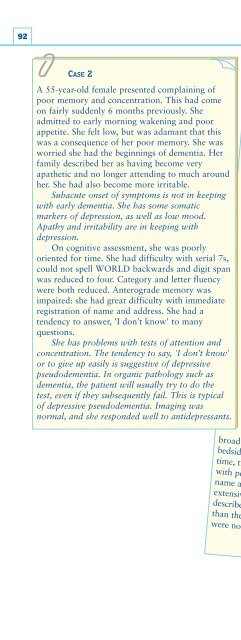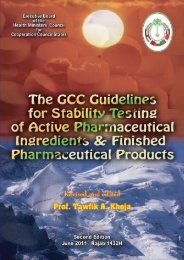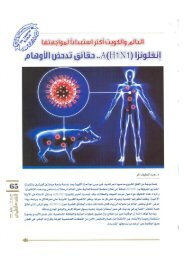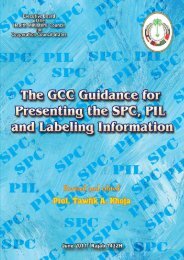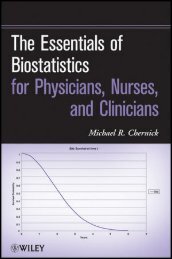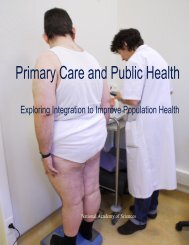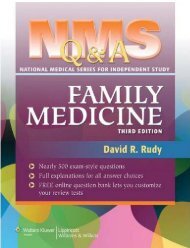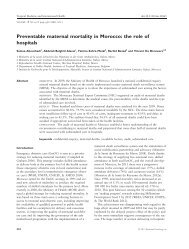You also want an ePaper? Increase the reach of your titles
YUMPU automatically turns print PDFs into web optimized ePapers that Google loves.
92CASE 2A 55-year-old female presented complaining ofpoor memory and concentration. This had comeon fairly suddenly 6 months previously. Sheadmitted to early morning wakening and poorappetite. She felt low, but was adamant that thiswas a consequence of her poor memory. She wasworried she had the beginnings of dementia. Herfamily described her as having become veryapathetic and no longer attending to much aroundher. She had also become more irritable.Subacute onset of symptoms is not in keepingwith early dementia. She has some somaticmarkers of depression, as well as low mood.Apathy and irritability are in keeping withdepression.On cognitive assessment, she was poorlyoriented for time. She had difficulty with serial 7s,could not spell WORLD backwards and digit spanwas reduced to four. Category and letter fluencywere both reduced. Anterograde memory wasimpaired: she had great difficulty with immediateregistration of name and address. She had atendency to answer, 'I don’t know' to manyquestions.She has problems with tests of attention andconcentration. The tendency to say, 'I don’t know'or to give up easily is suggestive of depressivepseudodementia. In organic pathology such asdementia, the patient will usually try to do thetest, even if they subsequently fail. This is typicalof depressive pseudodementia. Imaging wasnormal, and she responded well to antidepressants.CASE 3A 60-year-old male was admitted with acuteconfusion under the influence of alcohol. He wasfound to be dehydrated, and was given intravenousdextrose infusion. On recovery, it was noted that hetended to ask nursing staff the same questionsrepeatedly. He also insisted that he was 25 years old,and needed to go back to his army base.Repeated questioning suggests that he is amnesic.His insistence that he is 25 indicates that theamnesia also has a significant retrogradecomponent. The sudden onset of his symptomsprecipitated by alcohol raises the possibility ofWernicke’s encephalopathy followed by Korsakoff’spsychosis.His sister commented that he was sure it wasthe 1960s, and he appeared to have no knowledgeof his personal life events since then. He wasunable to learn new information about the family,which she had told him. He had been living aloneon an inadequate diet, and had been drinkingheavily before admission.Inability to learn new information shows thathe has anterograde amnesia. His lack ofknowledge of personal events since the 1960sdemonstrates retrograde amnesia. Theinadequate diet suggests that he may havethiamine deficiency. Administration ofintravenous dextrose in hospital can precipitateWernicke–Korsakoff syndrome.On general examination, he had evidence ofa mild peripheral neuropathy, but also had abroad based gait, and was unable to tandem gait. Onbedside cognitive examination, he was disoriented fortime, thinking it was 1968. Letter fluency was reducedwith perseverations. On testing memory, he registeredname and address, but delayed recall was 0. He had anextensive retrograde memory deficit, and could notdescribe public or autobiographical events more recentthan the 1960s. Language and visuo-spatial functionwere normal.(Continued on page 93)


